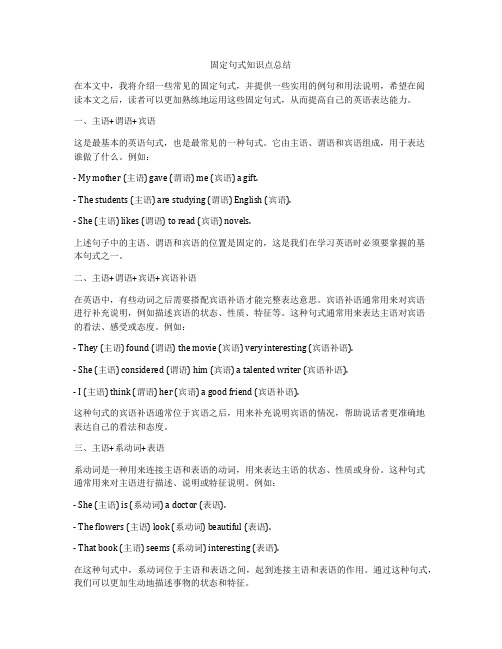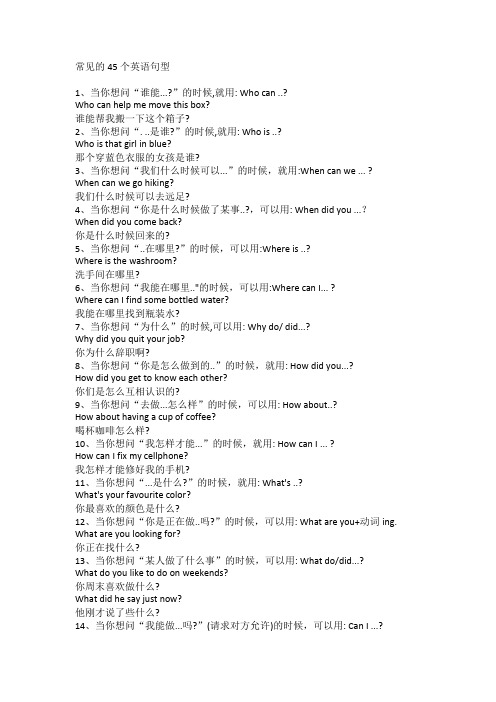常见重要句型
初中英语常见常考重点句型汇总(共121个)

初中英语常见常考重点句型汇总一、常见句型(80 个)【句型1】There+be +主语+地点状语/ 时间状语There's a boat in the river.河里有条船。
【句型2】I think “我认为.…” 否定式 I don't think...I think he is a good student.我认为他是个好学生。
I don't think any of them is interesting.我认为他们中任何一个都无趣。
【句型3】too...to..… 太……而不能...He is too young to go to school.他太小了不能去学校。
【句型4】It takes sb some time to do sth“干某事花了某人一段时间”,it是形式主语,后面的动词不定式(短语)才是真正的主语。
It takes him four hours to finish his homework.写作业花费了他四个小时。
【句型5】Though...+主句Though I like writing to my pen-friend,it takes a lot of time.虽然我喜欢给笔友写信,但它要耗费我大量时间。
【句型6】What about...?/How about...? “.…怎么样?”,about 为介词,其后须接名词、代词或 V-ing 等形式What about another cake? 再吃块蛋糕好吗?How about going out for a walk? 出去散散步好吗?【句型7】What's wrong with+sb. / sth. ?此句型相当于What's the matter/trouble with.后+某物作宾语时,意为“某物出什么毛病了?”后+某人作宾语时,意为“某人怎么了?”What's wrong with your watch?你的手表有什么毛病?【句型8】How do you like...?How do you like China?你觉得中国怎么样?【句型9】What do you like about...?What do you like about China?你喜欢中国的什么?【句型10】How+adj. / adv. +主语+谓语 !What a/ an+adj. +n. +主语+谓语 !How cold it is today!今天多冷啊!What a fine picture it is!多美的一幅图画呀!【句型11】had better (not)+动词原形You'd better ask that policeman over there.你最好去问问那边的那个警察。
常用句型之主语be形容词名词定语

常用句型之主语be形容词名词定语主语+be+形容词名词定语,是英语中常用的句型之一。
该句型用于描述主语的特征、性质、状态等。
通过运用不同的形容词和名词定语,可以使句子更加生动有趣,提升文章的表达力。
以下是一些常见的主语be形容词名词定语的句式和例句:1. 主语+be+形容词- The weather is beautiful today.(今天天气很好。
)- She is intelligent and hardworking.(她聪明又勤奋。
)- The book is interesting.(这本书很有趣。
)2. 主语+be+名词定语- My sister is a doctor.(我姐姐是医生。
)- The dog is a loyal companion.(这只狗是忠诚的伙伴。
)- This car is a high-performance vehicle.(这辆车是一辆高性能车。
)3. 主语+be+形容词+名词定语- The movie was a thrilling experience.(这部电影令人激动。
)- His speech was an inspiring moment for all of us.(他的演讲给我们所有人带来了启发的时刻。
)- The meal is a delicious treat.(这顿饭是一道美味的享受。
)4. 主语+be+形容词+不定式短语- My brother is excited to start his new job.(我哥哥很兴奋地开始了他的新工作。
)- She is eager to learn new things.(她渴望学习新的事物。
)- The students are happy to receive their exam results.(学生们很高兴地收到了他们的考试成绩。
)5. 主语+be+形容词+that从句- It is important that we take care of the environment.(保护环境是重要的。
固定句式知识点总结

固定句式知识点总结在本文中,我将介绍一些常见的固定句式,并提供一些实用的例句和用法说明,希望在阅读本文之后,读者可以更加熟练地运用这些固定句式,从而提高自己的英语表达能力。
一、主语+谓语+宾语这是最基本的英语句式,也是最常见的一种句式。
它由主语、谓语和宾语组成,用于表达谁做了什么。
例如:- My mother (主语) gave (谓语) me (宾语) a gift.- The students (主语) are studying (谓语) English (宾语).- She (主语) likes (谓语) to read (宾语) novels.上述句子中的主语、谓语和宾语的位置是固定的,这是我们在学习英语时必须要掌握的基本句式之一。
二、主语+谓语+宾语+宾语补语在英语中,有些动词之后需要搭配宾语补语才能完整表达意思。
宾语补语通常用来对宾语进行补充说明,例如描述宾语的状态、性质、特征等。
这种句式通常用来表达主语对宾语的看法、感受或态度。
例如:- They (主语) found (谓语) the movie (宾语) very interesting (宾语补语).- She (主语) considered (谓语) him (宾语) a talented writer (宾语补语).- I (主语) think (谓语) her (宾语) a good friend (宾语补语).这种句式的宾语补语通常位于宾语之后,用来补充说明宾语的情况,帮助说话者更准确地表达自己的看法和态度。
三、主语+系动词+表语系动词是一种用来连接主语和表语的动词,用来表达主语的状态、性质或身份。
这种句式通常用来对主语进行描述、说明或特征说明。
例如:- She (主语) is (系动词) a doctor (表语).- The flowers (主语) look (系动词) beautiful (表语).- That book (主语) seems (系动词) interesting (表语).在这种句式中,系动词位于主语和表语之间,起到连接主语和表语的作用。
英语六级常用句式

英语六级常用句式以下是一些英语六级考试中常用的句式:It is + 强调部分+ that + 其他部分这个句型用于强调某个句子成分,如主语、宾语、状语等。
例如:It is the children who are the most important part of the family.主语+ 系动词+ 表语这个句型用于描述主语的性质或状态。
例如:The book is very interesting.主语+ 谓语+ 宾语这个句型是最基本的句型,用于描述主语执行的动作或行为。
例如:I love you.主语+ 谓语+ 间接宾语+ 直接宾语这个句型用于描述主语给予或传递某物给某人。
例如:I give him a book.主语+ 谓语+ 宾语+ 宾补这个句型用于描述主语执行的动作或行为对宾语产生的影响或结果。
例如:I found him sleeping.并列句由并列连词连接的两个或多个简单句构成。
例如:I like apples, but I don't like bananas.从句从句是复合句中的一个子句,用来修饰主句中的某个成分。
常见的从句类型包括名词性从句、定语从句和状语从句等。
例如:When he was young, he liked to play with his friends.倒装句将谓语或部分谓语放在主语之前,以强调某种情感或语气。
例如:Never have I seen such a beautiful place.省略句为了使语言更加简洁明了,可以省略一些不必要的成分。
例如:If you want to go to the party, you can come with me. (省略了主语和系动词)强调句通过使用强调词或强调结构来突出某个成分的重要性。
例如:It was she who solved the problem.。
英语中常见的句型

英语中常见的句型英语作为全球通用语言,其句型结构丰富多样,是构成语言表达的基础。
了解和掌握英语中常见的句型,对于提高英语水平、增强表达能力具有重要意义。
本文将系统介绍英语中常见的句型,并分析其结构、用法及在实际交流中的应用。
一、简单句简单句是包含一个主语和一个谓语的句子。
它是最基本的句型,用于表达完整的思想。
根据谓语的性质,简单句可分为以下几类:1. 主语+不及物动词例如:She smiled.(她笑了。
)2. 主语+及物动词+宾语例如:They bought a new car.(他们买了一辆新车。
)3. 主语+系动词+表语例如:He is a teacher.(他是一名教师。
)4. 主语+及物动词+间接宾语+直接宾语例如:John gave Mary a gift.(约翰给了玛丽一份礼物。
)5. 主语+及物动词+宾语+宾语补足语例如:We found the house empty.(我们发现房子是空的。
)二、并列句并列句是由并列连词连接的两个或多个简单句。
这些简单句在语法上是平等的,没有主次之分。
常见的并列连词有and、but、or等。
例如:She likes music, but he prefers sports.(她喜欢音乐,但他更喜欢运动。
)三、复合句复合句包含一个主句和一个或多个从句。
从句在句中充当主语、宾语、表语、定语或状语等成分。
根据从句的性质,复合句可分为以下几类:1. 名词性从句名词性从句包括主语从句、宾语从句、表语从句和同位语从句。
它们在句中分别充当主语、宾语、表语和同位语。
(1)主语从句例如:What he said is true.(他说的是真的。
)(2)宾语从句例如:I know that he is honest.(我知道他是诚实的。
)(3)表语从句例如:The problem is when we can arrive.(问题是我们什么时候能到达。
)(4)同位语从句例如:The rumor that he resigned is untrue.(他辞职的传言是不真实的。
英语常用句型解析

英语常用句型解析英语是全球通用的语言之一,而掌握好英语句型则是学好英语的第一步。
下面我们就为大家介绍英语常用句型,希望对大家的学习有所帮助。
一、陈述句陈述句是最常见的一类句型,用来陈述一个事实、情况或观点。
例句:1. I like pizza.(我喜欢比萨饼。
)2. The sun rises in the east and sets in the west.(太阳从东方升起,西方落下。
)3. He is a teacher.(他是一名教师。
)二、疑问句疑问句用来询问对方,一般以疑问词开头。
例句:1. What is your name?(你叫什么名字?)2. Where do you live?(你住在哪里?)3. When is your birthday?(你的生日是什么时候?)三、否定句否定句用来否定某件事情或状况。
例句:1. I don't like coffee.(我不喜欢咖啡。
)2. He doesn't speak Spanish.(他不会说西班牙语。
)3. They aren't coming to the party.(他们不来参加聚会。
)四、祈使句祈使句是用来表达请求、命令、建议等。
例句:1. Please be quiet.(请保持安静。
)2. Don't forget your umbrella.(别忘了带伞。
)3. Let's go to the movies.(我们一起去看电影吧。
)五、感叹句感叹句用来表达强烈的情感或感叹。
例句:1. What a beautiful day!(多么美好的一天啊!)2. I can't believe it!(我简直不敢相信!)3. How delicious this cake is!(这个蛋糕怎么这么好吃!)六、条件句条件句是指某件事情发生的前提条件。
例句:1. If it rains tomorrow, I will stay at home.(如果明天下雨,我会呆在家里。
常见的45个英语句型

常见的45个英语句型1、当你想问“谁能...?”的时候,就用: Who can ..?Who can help me move this box?谁能帮我搬一下这个箱子?2、当你想问“. ..是谁?”的时候,就用: Who is ..?Who is that girl in blue?那个穿蓝色衣服的女孩是谁?3、当你想问“我们什么时候可以...”的时候,就用:When can we ... ? When can we go hiking?我们什么时候可以去远足?4、当你想问“你是什么时候做了某事..?,可以用: When did you ...?When did you come back?你是什么时候回来的?5、当你想问“..在哪里?”的时候,可以用:Where is ..?Where is the washroom?洗手间在哪里?6、当你想问“我能在哪里.."的时候,可以用:Where can I... ?Where can I find some bottled water?我能在哪里找到瓶装水?7、当你想问“为什么”的时候,可以用: Why do/ did...?Why did you quit your job?你为什么辞职啊?8、当你想问“你是怎么做到的..”的时候,就用: How did you...?How did you get to know each other?你们是怎么互相认识的?9、当你想问“去做...怎么样”的时候,可以用: How about..?How about having a cup of coffee?喝杯咖啡怎么样?10、当你想问“我怎样才能...”的时候,就用: How can I ... ?How can I fix my cellphone?我怎样才能修好我的手机?11、当你想问“...是什么?”的时候,就用: What's ..?What's your favourite color?你最喜欢的颜色是什么?12、当你想问“你是正在做..吗?”的时候,可以用: What are you+动词ing. What are you looking for?你正在找什么?13、当你想问“某人做了什么事”的时候,可以用: What do/did...?What do you like to do on weekends?你周末喜欢做什么?What did he say just now?他刚才说了些什么?14、当你想问“我能做...吗?”(请求对方允许)的时候,可以用: Can I ...?Can I take a look at your notebook?我能看一下你的笔记本吗?15、当你想问“你能做... 吗?”,提出请求的时候,可以用: Could you/Would you...? Could you tell me what time the store is open?你能告诉我这家店几点营业吗?16、当你想问“你是...吗?”的时候,就用: Are you...?Are you Mr. Brown?你是布朗先生吗?Are you making dinner now?你现在是在做晚饭吗?17、除此之外,问对方很多其他情况,都可以用: Doyou+动词...Do you need any help?你需要帮助吗?Do you mind if I open the window?你介意我打开窗户吗?18、当你想要问“你是否(已经)做了某件事”的时候,可以用: Have you ..? Have you seen the message I sent you?你(已经)看到我发给你的信息了吗?19、当你想问某事物的情况的时候, 可以用: Is it ..?Is it close to your house?那离你家近吗?20、当你想陈述自己的情况和观点的时候,可以用: I'm (not)+形容词/名词I'm good at dancing.我擅长跳舞。
语文各种句型

语文各种句型语文的句型是语言表达中非常重要的一部分。
不同的句型可以体现出不同的语言风格和表达效果。
本文将介绍一些常见的句型及其应用。
1. 主谓句主谓句是最基本的句型。
它由主语和谓语构成,表达出一个完整的意思。
例如:我喜欢吃水果。
这个句子的主语是“我”,谓语是“喜欢吃水果”。
主谓句适用于表述简单的事实、描述和陈述观点、表达命令等。
2. 并列句并列句是由两个或多个并列的主谓句构成的句子。
这些主谓句之间用逗号、分号或连词等连接。
例如:他喜欢看电影,她喜欢听音乐。
这个句子由两个并列的主谓句构成,中间用逗号连接。
并列句适用于表达对比、并列或转折等关系。
3. 复合句复合句包括主句和从句两部分。
其中,主句是完整的句子,而从句则是句子中的一部分,不能独立存在。
例如:我喜欢唱歌的时候,总是会忘记时间。
这个句子包括一个主句“我喜欢唱歌的时候”和一个从句“总是会忘记时间”。
复合句适用于表达因果关系、条件关系、时间先后关系等。
4. 祈使句祈使句是表示请求、命令、劝告等语气的句子。
它通常由一个动词或动词短语组成,而主语则省略。
例如:关上门。
这个句子省略了主语,直接表达了命令的语气。
祈使句适用于表达请求、命令、劝告和建议等。
5. 疑问句疑问句是用问句语气表达疑问的句子。
它通常以问句词或助动词开头。
例如:你明天要去看电影吗?这个句子以助动词“要”开头,表达了疑问的语气。
疑问句适用于询问信息和确认事实等。
6. 感叹句感叹句是表示强烈感情的句子。
它通常以感叹词或感叹性状语开头。
例如:多么美丽的风景啊!这个句子以感叹词“多么”和感叹性状语“美丽的风景”开头,表达了强烈的感情。
感叹句适用于表达喜悦、惊讶、惋惜等强烈的情感。
7. 单句省略句单句省略句是指省略了一些成分,但仍然可以表示完整的意思的句子。
例如:我们去看电影吧。
这个句子省略了主语“你”或“我们”,但是可以根据上下文推断出来。
单句省略句适用于日常口语中的简化表达。
8. 由主语和宾语构成的句式由主语和宾语构成的句式是句子中重要的句式之一。
- 1、下载文档前请自行甄别文档内容的完整性,平台不提供额外的编辑、内容补充、找答案等附加服务。
- 2、"仅部分预览"的文档,不可在线预览部分如存在完整性等问题,可反馈申请退款(可完整预览的文档不适用该条件!)。
- 3、如文档侵犯您的权益,请联系客服反馈,我们会尽快为您处理(人工客服工作时间:9:00-18:30)。
常见重要句型
1.It was (not )+ 时间段+before +一般过去时过了一段时间就……..
It will (not )be+ 时间段+before +一般现在时要过一段时间才会…
It is/ has been +时间段+ since…..
It was +点时间+ when…..
It was +时间状语+ that …..(强调句)
1).It was not long before he sensed the dangerof the position.不久他就意识到他处境危险
2).It will be half a year before you graduatefrom the school.还有半年你才从这个学校毕业
3).It is 3 years since he worked here.=he left here.(since从句中的谓语动词若是延续性动词,要从这个动作结束的时候算起)
4).It was 3 o’clock when they received thetelephone.
5)It was at 3 o’clock that they received thetelephone.
2.once…..一旦…..,表示时间和条件
1)Once you understand what the teacherexplained,you will have no difficulty doingthe work.
2).Once you have decided to do something,you should finish it and do it well.3.The +比较级…….,the +比较级……..越……,越……
1)The more books you read,the more knowledge you will get.
2)The busier he is,the happier he feels.
4.as if/ as though…..(表示与事实相反,用虚拟;若表示即将成为事实或有可能成为事实,则用陈述语气)
1).He was in great trouble,but he acted as if nothing had happened.2).Although they just met for the first time,they talked as if they had been friends formany years
3).The clouds are gathering.It looks as if it is going to rain.
5.n./adj./ adv./ v.+ as / though +主语+谓语,尽管……,…….引导让步状语从句
1).Child as he is,I already know what career I want to follow.
2).Try as he might,he couldn’t solve the problem.
3).Much as I respect him,I can’t agree with his idea.6.whether….or….无论是….还是….
1).Whether the weather is good or bad,they will set off as they planned.2).Any person,whether young or old,has his own worth.
7.疑问词+ever = no matter +疑问词,引导让步状语从句或名词性从句
1).Whichever(=Nomatter which)you like,you can take it away .(让步状语从句)
Youcan take away whichever(=anyone that)you like (名词性从句)2).Whenever you comes,you will be welcome.(让步状语从句)3).Whatever happens,I will support you.(让步状语从句)4).Whoever breaks the law,he will certainly be punished.(让步状语从句)Whoeverbreaks the law will certainly be punished.(名词性从句)5).However great the difficulty is,we can overcome it.(让步状语从句)8.as long as/so long as/ providing that/ provided that/ supposing that/on condition that 假如…..
1).I will lend you money on condition that youcan return it within 3 months.9.in case that/ in case of…..万一…..,以防…..
1).In case of fire,please dial 119 at once.
2).In case that John comes/ John should come,tell him to wait.
10.祈使句+ or/otherwise +结果句或祈使句+ and +结果句
1).Stop doing such foolish thing,or you will be punished in time.2).More effort,and the problem would have been settled.
3).Think it over,and you will find the answer.
11.so/ such……..that…….引导结果状语从句时须注意
当名词前many,much,little,few有修饰时,用so不用such因为此时的中心词不再是名词,而是many,much,little,few这些表示数量的词。
1).The westerners eat so much fat and sugarthat they put on weight easily.
2).There are so few fish in the lake that wecouldn’t fish them easily.
当名词是单数可数名词,前面又由adj.修饰时,注意冠词的位置,即so+ adj +a (n)+n或such+ a(n)+ adj.+ n
1).He is such an honest person/ so honest aperson that you can depend on him when you are in trouble.当so/such引导的部分位于句首时,主句要用部分倒装结构
1).Such great progress has he made in hisstudies that we all admire him.
当主从句主语一致时可与动词不定式相互转换,即变成so/such…….as to do结构。
1).The westerners eat so much fat and sugar asto put on weight easily.
12.so that 引导目的状语从句与结果状语从句
so that引导目的状语从句时常与情态动词连用(= in order that),当主从句主语一致时可转换为so as to do/ in order to do.
1).He turned up the radio a little so that hecould hear the news clearly.
He turned up the radio a little so as to hear the news clearly.
2).He closed all the windows while driving sothat he shouldn’t catch cold.(否定句中情态动词用shouldn’t)
so that 引导结果状语从句一般不与情态动词连用
1).He turned up the radio a little so that heheard the news clearly.。
